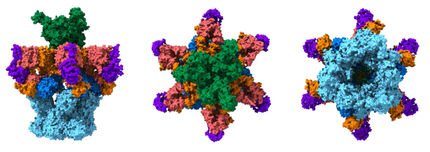UofL receives Bill and Melinda Gates Foundation Grand Challenges TB biomarkers grant
The University of Louisville announced that it will receive a tuberculosis (TB) biomarkers grant through the Bill & Melinda Gates Foundation's Grand Challenges in Global Health program, an initiative which seeks to overcome persistent bottlenecks in creating new tools that can radically improve health in the developing world. James E. Graham, Ph.D., associate professor of microbiology and immunology at the UofL School of Medicine, will pursue an innovative research project to identify and validate TB biomarkers, titled "Disposable Sampling Plate and Breath Test to Identify Patients with Active Tuberculosis."
The Grand Challenges TB biomarkers program provides funding for groundbreaking research into TB biomarkers for the development of a low-cost, simple to use tool that can quickly and accurately diagnose TB in developing countries.
"There is an urgent need to break through barriers in biomarker research in order to develop a highly-sensitive point-of-care diagnostic to improve identification of active TB cases," said Chris Wilson, Director of Global Health Discovery at the Bill & Melinda Gates Foundation. "We hope these innovative ideas lead to effective and affordable TB diagnostics that can make an impact on one of the world's deadliest infectious diseases." Graham's project is one of 10 Grand Challenges TB biomarkers grants announced today.
The UofL project was awarded $576,800 over two years for an interdisciplinary study headed by Graham with Xiao-an "Sean" Fu, Ph.D., assistant professor of chemical engineering in the Speed School of Engineering; Richard M. Higashi, Ph.D., professor of chemistry, and Michael H. Nantz, Ph.D., professor of chemistry, in the College of Arts and Sciences; and Timothy L. Wiemken, Ph.D., instructor in the infectious diseases division of the department of medicine in the School of Medicine. This is UofL's first grant from the Bill & Melinda Gates Foundation.
UofL researchers are investigating a device prototype they developed for sampling volatile components of the breath. The device consists of a disposable silicon plate with reactive chemical coatings placed inside a glass vial. The patient breathes into the vial through a drinking straw and the disposable plate captures volatile chemical markers in human breath that indicate the presence of respiratory disease. To identify markers, the plate is then processed and analyzed by mass spectrometry. Researchers will be able to use combinations of detected compounds to identify TB bacteria in the lung, diagnosing the active state, which is the only contagious form of disease.
The researchers think their device might ultimately replace sputum smear microscopy, the current test for active TB. With microscopy, the patient must cough to produce sputum, which is then stained and analyzed in the laboratory under a microscope. The UofL project proposes an easier process for patients; instead of forcing a cough, patients will simply breathe into a straw and onto the sampling plate. The disposable plate method also is thought to ultimately be less expensive and capable of being the basis for a "point of care" diagnostic test independent of the need for additional laboratory work. This will be important for the goal of developing a global approach to improve TB diagnosis.
Along with the research itself, the project's interdisciplinary scope – involving engineering, chemistry, biology and immunology – excites Graham. "It is not often that engineers, chemists and the life scientists are able to come together to solve problems," he said. "This is research that none of us could do alone. This grant enables us to put our different research expertise together to address a major global health issue."
Most read news
Organizations

Get the analytics and lab tech industry in your inbox
By submitting this form you agree that LUMITOS AG will send you the newsletter(s) selected above by email. Your data will not be passed on to third parties. Your data will be stored and processed in accordance with our data protection regulations. LUMITOS may contact you by email for the purpose of advertising or market and opinion surveys. You can revoke your consent at any time without giving reasons to LUMITOS AG, Ernst-Augustin-Str. 2, 12489 Berlin, Germany or by e-mail at revoke@lumitos.com with effect for the future. In addition, each email contains a link to unsubscribe from the corresponding newsletter.























































